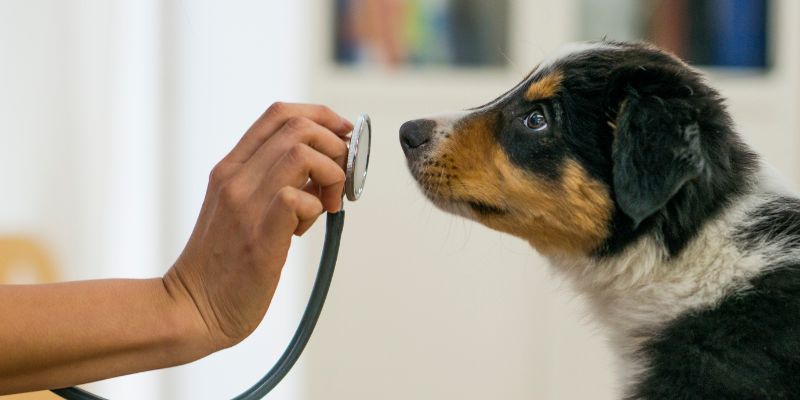Welcoming a new puppy into your family is an exciting time in your life–and busy! In the span of a few short months, you’re helping your puppy learn about the world around them, taking them to new places, introducing them to new people (and new dogs), and getting to know their personality.
Puppy-dom is also a critical point in their life to start investing in proper health and wellness care for your pet. This guide covers the basics of finding a veterinarian for your puppy’s first exam, important wellness care points for their first year, and how pet insurance can be a good investment for your new family member.
There’s no better time to start pet insurance than when your dog is still a puppy as they’ll generally have access to lower premiums and more coverage options than when they get older. To start comparing plans, check out our top-rated pet insurance companies, or keep reading to find out key health milestones in your puppy’s first year.

Choosing a Veterinarian
It's important to look for a veterinarian as soon as you bring a new pup into your home, or even start researching options before arrival day. Even if you adopt a puppy who is already spayed or neutered and is up to date on their vaccines, emergencies and illnesses (or an accidentally-eaten sock) can crop up. If you already have a vet on-the-ready, you can more easily connect with them to take care of your pet.
Only work with accredited and experienced vets. In addition, look for a veterinarian that best meets your and your pet's needs. Some things to look for include:
- Open to new patients. Vets often close to new patients to ensure they can provide the best service to those they already have.
- Treatment philosophies that match yours. Look for a vet that supports your beliefs about treatments for your pup.
- Convenient location. If there’s an emergency, you’ll want to be able to quickly reach your vet's office.
- Hours of operation. Look for a vet office with opening hours convenient to your schedule so you’ll easily be able to make appointments with your pup.
Puppy's First Exam
Puppies should see a vet for the first time around 8 weeks old—sooner if you notice any issues that make you think the puppy is ill or hurt. If you adopt a puppy who is older than 8 weeks, schedule a vet exam within a few days of bringing them home to ensure they're in good health and establish a relationship for them with a local vet.
When you schedule the appointment, the vet's office should let you know what to bring. Some common information the vet may want includes vaccination and deworming records, any previous medical records if you have them, and the type of food your puppy eats. Some vets may also ask you to collect a stool sample and bring it along for testing, though many get a sample why the pup is in the office.
In preparing for your first exam, you may also want to write down some questions to ask the vet ahead of time. Common questions center on the best diet for the pup and how to prevent fleas, ticks, and heartworms. You may also want to ask about spaying and neutering, training, and what types of treats are safe for your pup.

Wellness Care for Pups
Your puppy's first vet exam provides you the opportunity to gather information about how to best take care of your pet. Diet and exercise are foundational for healthy dogs and your veterinarian is an excellent resource for questions about how to best take care of your puppy.
Ask your vet about what food and treats they recommend, what kind of exercise needs you can expect from your pup, and ideas for socializing with other dog owners. Provide healthy food while limiting treats and human food. Make time for your pup to play and experience the outdoors and set up a walk routine for exercise—and enjoy the time spent getting to know your new best friend!
Additionally, there are several medical milestones that are good ideas to take care of the following within the first year of your puppy's life.
Microchips
Almost 10 million pets go missing every year. An up-to-date collar tag can help reunite you with a lost pet if they're lost, but tags can fall off of collars and, in cases where pets are stolen, collars can be removed. A microchip is a much more secure method of ensuring your dog can be identified.
These tiny devices are injected under loose skin in a procedure your pup may barely notice and don’t require any special aftercare. All you have to do is keep the data associated with the microchip up-to-date. If your dog is found by or brought to a vet office or shelter, they can scan the chip, look up your phone number or other contact details, and reach out to reunite you and your pet.

Vaccinations
Puppy vaccinations help keep your canine companion healthy by warding off common diseases. In some areas, certain vaccines are required by law; states require most dogs to be vaccinated against rabies.
Most vets recommend what are called "core vaccines" for all dogs. These are vaccines that protect against:
- Canine distemper virus, which is highly contagious, has no cure, and can be fatal.
- Parvovirus, which is spread through feces and can cause digestive distress and loss of appetite.
- Parainfluenza virus, which is one virus that can cause kennel cough.
- CAV-1 and CAV-2, which cause hepatitis and kennel cough respectively.
Your vet may also recommend other vaccines depending on where you live, how healthy your pup is, and what type of lifestyle you plan to lead with your dog. If you'll be traveling a lot with your pup to other regions or using boarding or dog daycare services, he or she might be at risk of other diseases.
Spay or Neuter
Spaying and neutering are two of the most common procedures for dogs. In addition to preventing unwanted litters, spaying or neutering can improve your dog’s behavior and reduce or eliminate the possibility of developing certain cancers. Some vets recommend around 6 months as the best age to spay or neuter a dog, but it does depend on the breed of dog and other factors, such as overall health.
When speaking with your vet about these procedures, ask whether they're right for your dog, and when is the best time. Bring it up at your puppy's first vet appointment. While it might be too soon at that time, the vet can let you know when you should schedule the procedure. Waiting until the optimal age for your pup has passed could make the procedure more difficult and increase the recovery time for your dog.

Parasite Prevention
A dog vet exam usually includes parasite screening. Your vet may take fecal samples to check for heartworms and visibly inspect your dog for fleas or ticks. Vets can recommend or prescribe treatments to help prevent parasites, including:
- Topical medication that you apply to the dog periodically to prevent fleas and ticks
- Collars that contain flea and tick repelling compounds
- Oral medications to help prevent heartworm
Good hygiene practices can also help reduce parasite risks. Regular bathing–at home or with a groomer–using appropriate products can help keep your pup healthy and itchy-free.
Dental Care
During a vet exam, your provider typically checks your puppy's teeth and gums to promote overall mouth health. They may provide some recommendations for doggy dental care, but you can also use a variety of products to keep your canine's teeth clean and healthy as they grow from puppy to adulthood.
It’s easiest to start good dental habits when you have a puppy, as you can more easily get them used to brushing their teeth when they’re young. There are also dental chews and treats that help reduce plague and other issues. Especially as your puppy gets older, they may benefit from getting their teeth professionally cleaned every year. It’s a great opportunity for your veterinarian to ensure their teeth and gums are healthy and get a deep clean of your dog’s mouth.

Puppy Insurance Plans
As you can see, a lot of effort can go into keeping your pup a healthy, happy addition to your family. And we didn't even cover the care a sick or injured dog might require. Pet insurance for your puppy helps you take care of all these matters without a major impact to your budget.
We’ve done a deep dive on whether pet insurance is worth it to the average dog owner, but there are some additional considerations when we start talking about puppies. Starting pet insurance when you have a puppy or young dog solves two of the potential drawbacks to pet insurance:
- Most pet insurers don’t cover pre-existing conditions–and almost nothing is pre-existing to a puppy; and
- The starting rate for a pet insurance plan goes up as your dog gets older-and some insurance companies let you lock in your puppy’s rate.
Puppies are also frequently the only time when wellness plan coverage is worth it. Wellness coverage is usually an add-on package that can help cover the costs for some of the common veterinarian expenses seen in your puppy’s first year: an annual exam, their spay or neuter, blood panels, vaccinations, microchip, and parasite treatments.
Additionally to the financial benefit, pet insurance helps provide peace of mind; no matter what misadventures your puppy gets into (or how many), you’ll have help getting them back on their feet.

Start Life With Your Pup With Financial Peace of Mind
A new puppy means lots of laughs and love for your family. Whether you're running around in the backyard teaching your dog new games or cuddling with your pup while watching a movie, falling in love with your new friend is the easy part. Make sure you can afford to give him or her the best—shop now for pet insurance for your puppy by comparing plans today.


